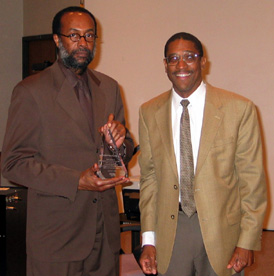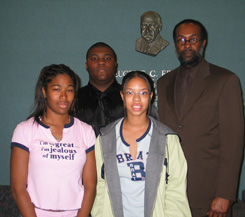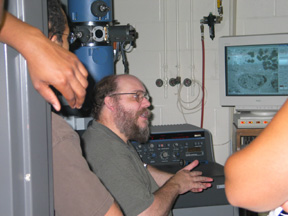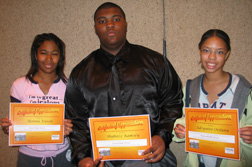 |
Dr. Walter Williams, left, receives a plaque from UNMC graduate student LeDon Bean for his participation in the program. |
So does Benson High School senior TeAnna Strickland.
LeDon Bean just smiles when he hears another minority student’s plans to pursue a higher education.
That’s the reason Bean, a UNMC graduate student in the department of pharmacology, started the “Stepping Forward and Reaching Back” program at UNMC five years ago.
“To hopefully inspire students to continue their education,” Bean said.
On Wednesday about 90 minority students from three local high schools and two middle schools attended the daylong program that included presentations by UNMC dental resident Jamar Anderson, D.D.S., and Walter Williams, M.D., director of the Office of Minority Health at the Centers for Disease Control and Prevention in Atlanta.
 |
Joining Dr. Walter Williams at the daylong event were, from left to right: Alanna Faison, North High, Shabazz Ramsey, Central High, and Adryanne Orduna, Monroe Middle School. |
“It’s a great program,” Orduna said. “And a good opportunity for kids that plan on being in the medical field.”
Strickland, who plans to study pre-medicine in college, said the presentation by Josette Gordon, M.D., who works at the Alegent Health Care Family Clinic, was especially helpful to her.
“Dr. Gordon explained what I had to do to get ready for medical school and how to apply,” Strickland said.
 |
Electron microscopist Tom Bargar explains to students the differences between a light microscope, similar to ones they would find in their science classrooms, and an electron microscope. |
“There are many pathways to success,” said Dr. Williams. “But I would encourage you to chose the one through education.”
Dr. Williams used slides to show the students how a lack of education can lead to poverty and limit access to quality health care.
The health status of minorities in the United States, said Dr. Williams, is directly related to their socioeconomic status.
“If you drop out of high school you are not going to make much of an income,” he told the students. “But with a college degree you will double your income.”
 |
Left to right: Alanna Faison, Shabazz Ramsey and Adryanne Orduna each received a certificate of appreciation for their presentations. Not pictured: Kamaal Patterson from Central High. |
“We need more of you to consider becoming doctors, nurses and dentists,” he said.
Alanna Faison, a student at North High School and one of four students asked to speak this year, said that although she may not seek a career in the medical field, she will pursue a higher education.
“The only way you fail,” Faison told her peers, “is if you never try.”